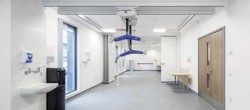Mark Rooney, Rental Divisional Director at Premier Modular, discusses healthcare challenges, and how temporary modular units can help NHS Trusts meet and balance huge demands on services.
NHS healthcare services are continuing to be at the forefront of dealing with the country's unpredictable evolving needs – facing high spikes of demand due to winter pressures, on top of pandemic backlogs and social care incidents – which strain capacity. Additional spaces – including ambulance units, medical discharge lounges, decant facilities and bed spaces – are required at pace to keep up with these ever-changing demands. As healthcare requirements constantly evolve, many NHS Trusts are uncertain of what they may need, even in the near future.
The healthcare demand cycle
Once winter pressures have been reduced, healthcare trusts need to move on to dealing with the next set of demands. All this limits how well the NHS can provide elective medical needs. As soon as the NHS has recovered from last winter's bottlenecks, they're then into summer and focus is on preparation for winter again.
Year after year, the NHS is put through a continuous cycle of various healthcare demands – with some being more urgent than others. This endless swerving from crisis to crisis restricts the NHS' ability to plan, leading to Trusts struggling with issues – including outpatient capacity – to supportintense seasonal needs. Some spikes in healthcare demands are endless, such as flu cases. However, the NHS can't reliably forecast how well it will cope with a particular interruption because government input, as well as other factors, vary so frantically over the years.
Efficiency
All healthcare services are interlinked, so it's essential to relieve each part of the health service to avoid it blocking another stage – for example, care homes being filled up, so hospitals are unable to discharge those patients in need of care. The speed at which relief arrives is just as important as the shape the relief takes, because it allows the NHS to stay one step ahead.
Plans to ease the load on the NHS tend to be last-minute and balanced between competing demands and stakeholders with fixed income targets, so Trusts need their building projects to be installed and delivered quickly.
Offsite modular units can provide space at pace. Built in half the time it would take using traditional bricks and mortar, a modular building operates just as effectively and can accommodate substantial patient numbers within a few weeks rather than months.
Capacity
The continual cycle of unpredictable spikes in service demand, including outpatient and social care, pushes the need for additional space. Once installed, a modular building can be reconfigured – widened, enlarged and stacked – to adapt to use changes or numbers of patients. To relieve healthcare service pressure and capacity, Trusts can rent modular units for as long or as little as needed – expanding and altering them to meet current demands and facility needs.
Flexibility
To account for the needs and pressures that Trusts are facing, bespoke solutions that offer full adaptability can be essential to solving these demands. If you need a turnkey solution, this can cover: designing, planning, foundations and internal layouts, connecting the modular unit with existing buildings, and ensuring the building is compliant with all NHS standards and healthcare regulations, including clinical sign off.
By collaboratively working with key healthcare stakeholders who are looking to put together specific business cases, processes can be adjusted to deliver bespoke, future proofed solutions, removing any obstacles that may be present.
By actively working with knowledgeable modular providers to forecast where bottlenecks may occur, a proactive approach can be taken for emergency response – meeting budgets, as well as capacity needs and, most importantly, caring for patients effectively.
For more information visit: www.premiermodular.co.uk
Images: 01. King's College Hospital, London









